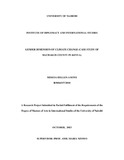| dc.contributor.author | Miseda, Hellen A | |
| dc.date.accessioned | 2013-11-27T06:06:47Z | |
| dc.date.available | 2013-11-27T06:06:47Z | |
| dc.date.issued | 2013-10 | |
| dc.identifier.citation | Degree of masters of Arts in international studies | en |
| dc.identifier.uri | http://erepository.uonbi.ac.ke:8080/xmlui/handle/123456789/60636 | |
| dc.description | A Research Project Submitted in Partial Fulfillment of the Requirements of the
Degree of Masters of Arts in International Studies of the University of Nairobi | en |
| dc.description.abstract | The purpose of this research was to determine the effects of climate change on sub-
Saharan woman and to examine the strategies that they have employed to mitigate these
effects. The study begins by examining climate change and what has been referred to by
world leaders as global warming. The hypotheses are clearly outlined and discussed in
chapter 1 of the study.
The literature review was done with rich source of publications to re-emphasize the fact
that their ideologies were in line with the study objectives. This strengthened the study.
The literature review focused a lot on the research questions and objectives. Thus, the
areas largely explored in the literature review were climate talks, resolutions adopted at
the various climate talks and the role of Sub-Saharan Africa in such climate talks. It also
explored the adaptation strategies for climate change.
The study also explores in detail, global warming and its challenges to a Kenyan woman,
with specific reference to women of Machakos County. In addition, the chapter seeks to
further enhance the reader’s understanding of global warming by exploring various
climate talks. It gives provides an in-depth understanding of global warming, taking the
readers through the history of climate change.
In conclusion, the study notes that climate change has variously impacted on the Kenyan
woman but they have managed to adapt. And the study examines these adaptation
strategies. As a result the study recommends that the both national government and
county governments need to strengthen women adaptation strategies, so as to enable them
respond more effectively to the negative impacts of climate change. | en |
| dc.language.iso | en | en |
| dc.publisher | University of Nairobi | en |
| dc.title | Gender Dimension of Climate Change (Case Study of Machakos County in Kenya) | en |
| dc.type | Thesis | en |
| local.publisher | Institute of Diplomacy and International Studies | en |

